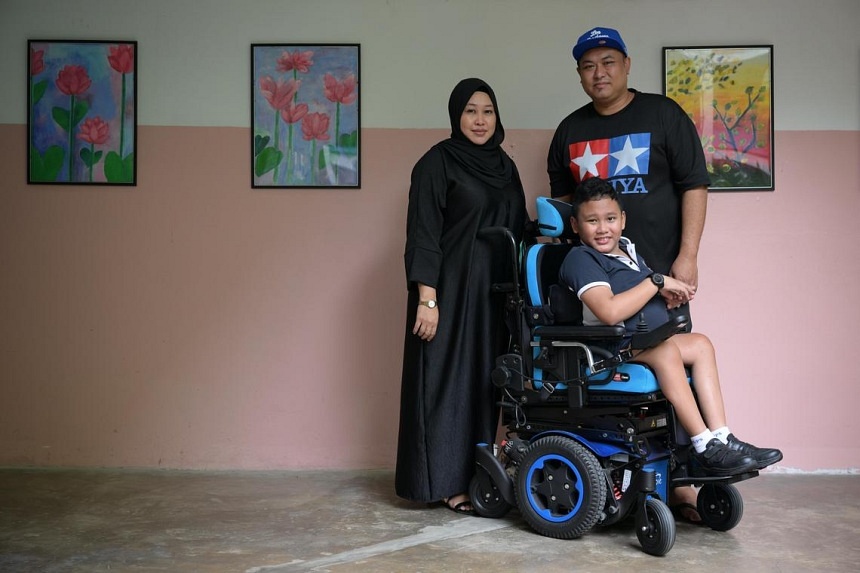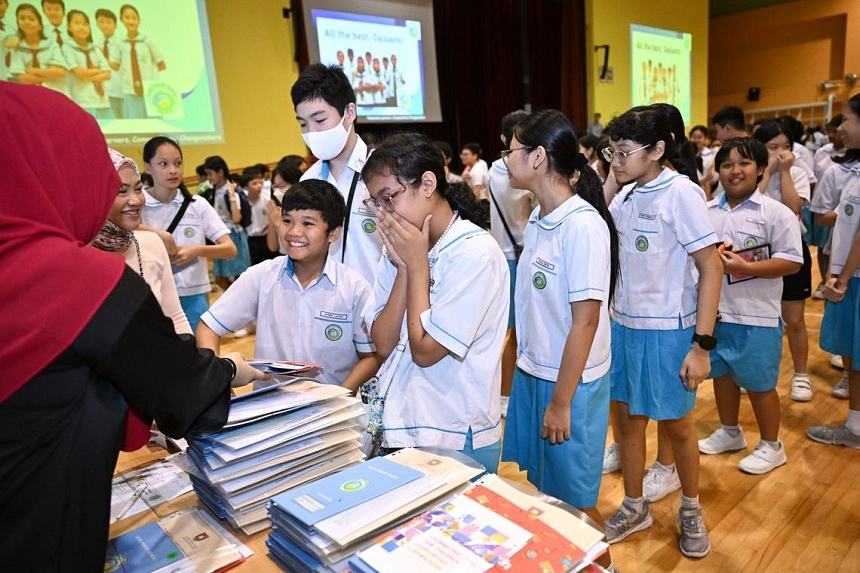- Joined
- Mar 11, 2013
- Messages
- 14,128
- Points
- 113
At just 10 years old, Ridhwan Fadli was hospitalised with a severe respiratory illness that triggered a heart attack, leaving him in a battle for his life.
What began as a simple flu worsened into an influenza infection that caused a myocardial infarction, which put him on life support for 14 days, said his parents, Mr Mohammad Fadli and Madam Siti Rizana.
Ridhwan’s heart condition, along with other complications such as stroke, resulted in him having to use a wheelchair as he was paralysed from the waist down.
His speech and cognitive abilities were also impacted.
Despite these setbacks, the North View Primary School pupil was determined not to let his condition hold him back.
“I never felt like giving up,” said Ridhwan, who is now 12.
“Although I was scared of failing my exams when I was in the hospital, my teachers helped me to overcome my fear.”
After spending three months in hospital, Ridhwan returned to school in Primary 5.
His teachers dedicated extra time to help him catch up with his schoolwork and adjust back to school life.
They taught him how to be resilient and overcome challenges.
He was also supported by his 38-year-old mother, who was his full-time caregiver, and his father, 42, who works as a delivery driver and drove him to and from school every day. His friends also helped him with his schoolwork.
Ridhwan has recovered now, although he remains a wheelchair user.

North View Primary School pupil Ridhwan Fadli with his mother and father, Madam Siti Rizana and Mr Mohammad Fadli. ST PHOTO: NG SOR LUAN
He was one of 40,894 pupils who sat the Primary School Leaving Examination (PSLE) in 2024.
Of this cohort, 98.5 per cent did well enough to progress to secondary school, said the Ministry of Education and Singapore Examinations and Assessment Board in a joint statement on Nov 20.
Of the 334 madrasah students in Singapore, 99.7 per cent, or 333, of them passed the PSLE, said the Islamic Religious Council of Singapore (Muis). There are four madrasah schools here offering primary education.
The 2024 PSLE marked the fourth year under the new Achievement Level (AL) scoring system, with a grade range of AL8 (lowest) to AL1 (highest proficiency).
Starting with the 2024 Secondary 1 cohort, full subject-based banding has been implemented in the secondary education system, replacing the Express, Normal (Academic) and Normal (Technical) streams.
Students are now placed into one of three posting groups – 1, 2 and 3 – mapped from the N(T), N(A) and Express standards, respectively.
They are grouped into form classes comprising students from the three posting groups, where they can take subjects at three academic levels known as G1, G2, and G3 (G stands for General). G1 roughly corresponds to N(T), G2 to N(A), and G3 to the Express standard.
Eligibility to take subjects such as English, mother tongue languages, mathematics and science at a more demanding level is based on students’ PSLE performance. For example, those who score AL5 or better in a standard-level subject can take it at G3 or G2, while those with AL grade A in a foundation subject can take it at G2.
Foundation-level subjects are a subset of what is covered at the standard level for those who are weaker in the subject.
For the 2024 Primary 6 cohort, about 65 per cent of students eligible for posting groups 1 and 2 are suitable to study at least one subject at a more demanding level. This means that if they are eligible to take a subject at G2, some students may have an option to take it at the G3 level. This is comparable with the 2023 cohort.

The 2024 PSLE marked the fourth year under the new Achievement Level (AL) scoring system, with a grade range of AL8 (lowest) to AL1 (highest proficiency). ST PHOTO: LIM YAOHUI
Ridhwan, who did not want to share his results, said he received favourable grades and is able to enrol in the school of his choice, Ahmad Ibrahim Secondary School.
He took foundation-level subjects for PSLE, after making the transition from standard-level subjects in 2024, which helped ease the stress of keeping up with his peers.
“I said to myself, ‘I can do it’,” Ridhwan said. “I remained confident.”
Describing his son as bubbly, friendly and cheerful, Mr Fadli said he supported Ridhwan through his journey by encouraging him and telling him positive things.
“It was hard to tell him that he cannot walk,” said Mr Fadli. “But I focused on telling him things like not to lose hope, and that things happen for a reason.”
Despite draining their savings on therapy and medical bills, the couple are inspired by their son’s determination to never give up.
“We have no worries about his results, and we just want the best for him,” said Mr Fadli.
https://www.straitstimes.com/singap...ool-boy-overcame-heart-condition-to-take-psle
What began as a simple flu worsened into an influenza infection that caused a myocardial infarction, which put him on life support for 14 days, said his parents, Mr Mohammad Fadli and Madam Siti Rizana.
Ridhwan’s heart condition, along with other complications such as stroke, resulted in him having to use a wheelchair as he was paralysed from the waist down.
His speech and cognitive abilities were also impacted.
Despite these setbacks, the North View Primary School pupil was determined not to let his condition hold him back.
“I never felt like giving up,” said Ridhwan, who is now 12.
“Although I was scared of failing my exams when I was in the hospital, my teachers helped me to overcome my fear.”
After spending three months in hospital, Ridhwan returned to school in Primary 5.
His teachers dedicated extra time to help him catch up with his schoolwork and adjust back to school life.
They taught him how to be resilient and overcome challenges.
He was also supported by his 38-year-old mother, who was his full-time caregiver, and his father, 42, who works as a delivery driver and drove him to and from school every day. His friends also helped him with his schoolwork.
Ridhwan has recovered now, although he remains a wheelchair user.

North View Primary School pupil Ridhwan Fadli with his mother and father, Madam Siti Rizana and Mr Mohammad Fadli. ST PHOTO: NG SOR LUAN
He was one of 40,894 pupils who sat the Primary School Leaving Examination (PSLE) in 2024.
Of this cohort, 98.5 per cent did well enough to progress to secondary school, said the Ministry of Education and Singapore Examinations and Assessment Board in a joint statement on Nov 20.
Of the 334 madrasah students in Singapore, 99.7 per cent, or 333, of them passed the PSLE, said the Islamic Religious Council of Singapore (Muis). There are four madrasah schools here offering primary education.
The 2024 PSLE marked the fourth year under the new Achievement Level (AL) scoring system, with a grade range of AL8 (lowest) to AL1 (highest proficiency).
Starting with the 2024 Secondary 1 cohort, full subject-based banding has been implemented in the secondary education system, replacing the Express, Normal (Academic) and Normal (Technical) streams.
Students are now placed into one of three posting groups – 1, 2 and 3 – mapped from the N(T), N(A) and Express standards, respectively.
They are grouped into form classes comprising students from the three posting groups, where they can take subjects at three academic levels known as G1, G2, and G3 (G stands for General). G1 roughly corresponds to N(T), G2 to N(A), and G3 to the Express standard.
Eligibility to take subjects such as English, mother tongue languages, mathematics and science at a more demanding level is based on students’ PSLE performance. For example, those who score AL5 or better in a standard-level subject can take it at G3 or G2, while those with AL grade A in a foundation subject can take it at G2.
Foundation-level subjects are a subset of what is covered at the standard level for those who are weaker in the subject.
For the 2024 Primary 6 cohort, about 65 per cent of students eligible for posting groups 1 and 2 are suitable to study at least one subject at a more demanding level. This means that if they are eligible to take a subject at G2, some students may have an option to take it at the G3 level. This is comparable with the 2023 cohort.

The 2024 PSLE marked the fourth year under the new Achievement Level (AL) scoring system, with a grade range of AL8 (lowest) to AL1 (highest proficiency). ST PHOTO: LIM YAOHUI
Ridhwan, who did not want to share his results, said he received favourable grades and is able to enrol in the school of his choice, Ahmad Ibrahim Secondary School.
He took foundation-level subjects for PSLE, after making the transition from standard-level subjects in 2024, which helped ease the stress of keeping up with his peers.
“I said to myself, ‘I can do it’,” Ridhwan said. “I remained confident.”
Describing his son as bubbly, friendly and cheerful, Mr Fadli said he supported Ridhwan through his journey by encouraging him and telling him positive things.
“It was hard to tell him that he cannot walk,” said Mr Fadli. “But I focused on telling him things like not to lose hope, and that things happen for a reason.”
Despite draining their savings on therapy and medical bills, the couple are inspired by their son’s determination to never give up.
“We have no worries about his results, and we just want the best for him,” said Mr Fadli.
https://www.straitstimes.com/singap...ool-boy-overcame-heart-condition-to-take-psle
